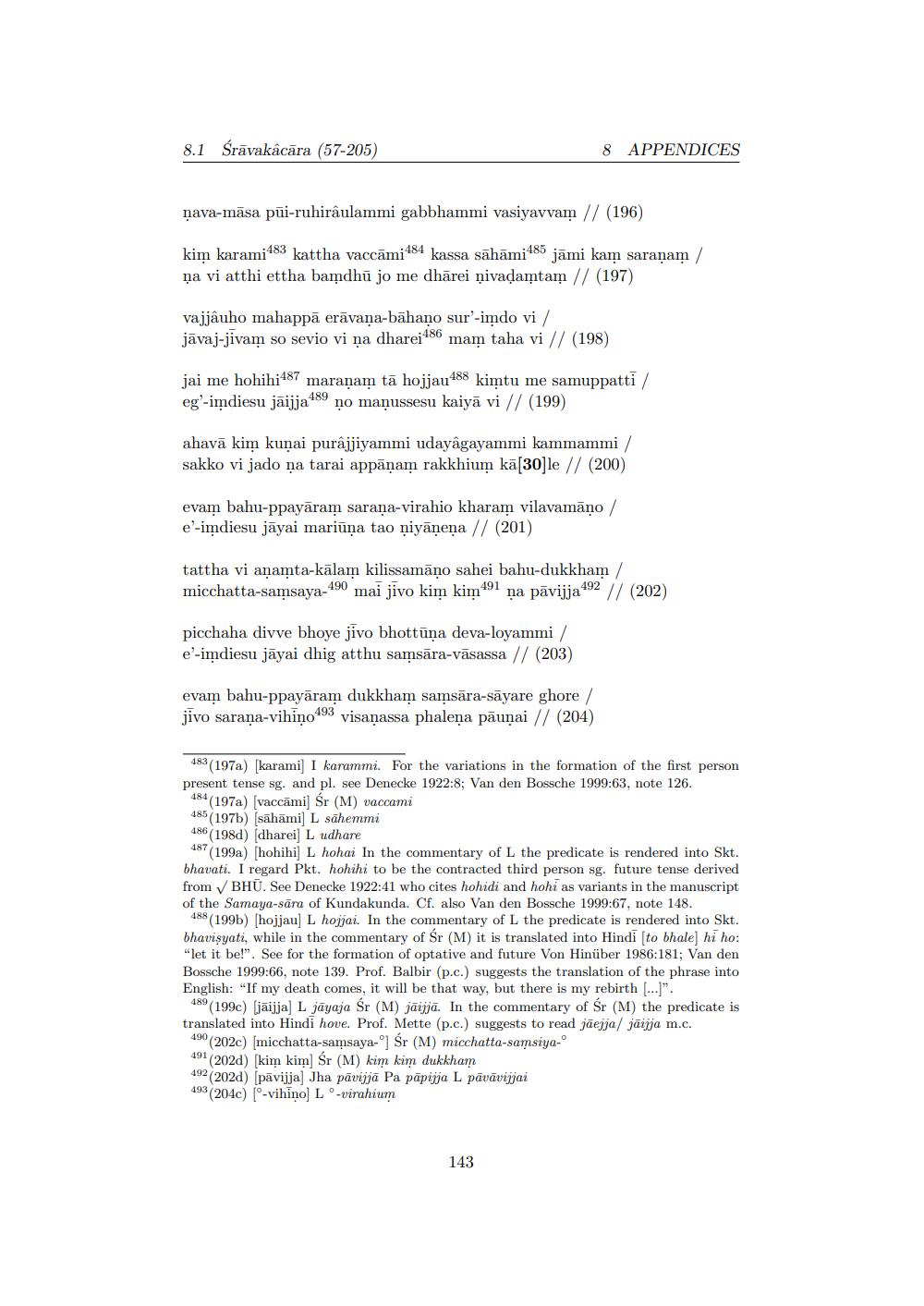________________
8.1
Srāvakâcāra (57-205)
8 APPENDICES
nava-māsa pūi-ruhirâulammi gabbhammi vasiyavvam // (196)
kim karami 483 kattha vaccāmi 484 kassa sāhāmi 485 jāmi kam saraṇam / ņa vi atthi ettha bamdhū jo me dhārei ņivadamtam // (197)
vajjauho mahappā erāvana-bahaņo sur'-imdo vi / jāvaj-jivam so sevio vi na dharei 486 mam taha vi // (198)
jai me hohihi487 maraṇam tā hojjau488 kimtu me samuppatti / eg-imdiesu jāijja489 no maņussesu kaiyā vi // (199)
ahavā kim kuņai purâjjiyammi udayagayammi kammammi / sakko vi jado na tarai appāņam rakkhium kā[30]le // (200)
evam bahu-ppayāram sarana-virahio kharam vilavamāņo / e' imdiesu jāyai mariūna tao niyānena // (201)
tattha vi anamta-kālam kilissamāno sahei bahu-dukkham / micchatta-samsaya-490 mai jivo kim kim491 na pāvijja492 // (202)
picchaha divve bhoye jivo bhottūna deva-loyammi / e-imdiesu jāyai dhig atthu samsāra-vāsassa // (203)
evam bahu-ppayāram dukkham samsāra-sāyare ghore / jivo sarana-vihiņo493 visanassa phaleņa pāunai // (204)
483 (1972) karami) I karammi. For the variations in the formation of the first person present tense sg. and pl. see Denecke 1922:8; Van den Bossche 1999:63, note 126. 484 (197a) (vaccāmi) Śr (M) vaccami 485 (197b) (sāhāmi) L sāhemmi 486 (1980) (dharei) L udhare 487 (1992) hohihi] L hohai In the commentary of L the predicate is rendered into Skt. bhavati. I regard Pkt. hohihi to be the contracted third person sg. future tense derived from BHŪ. See Denecke 1922:41 who cites hohidi and hohi as variants in the manuscript of the Samaya-sāra of Kundakunda. Cf. also Van den Bossche 1999:67, note 148.
488 (1996) [hojjau] L hojjai. In the commentary of L the predicate is rendered into Skt. bhavisyati, while in the commentary of Sr (M) it is translated into Hindi (to bhale] hi ho: "let it be!". See for the formation of optative and future Von Hinüber 1986:181; Van den Bossche 1999:66, note 139. Prof. Balbir (p.c.) suggests the translation of the phrase into English: "If my death comes, it will be that way, but there is my rebirth (...)".
489 (1990) (jāijja L jāyaja Śr (M) jāijja. In the commentary of Sr (M) the predicate is translated into Hindi hove. Prof. Mette (p.c.) suggests to read jāejja/ jāijja m.c. 490 (202c) (micchatta-samsaya-°) Śr (M) micchatta-samsiya-o 491 (202) [kim kim Śr (M) kim kim dukkham 492 (202d) pāvijja Jha pāvijjā Pa pāpija L pāvāvijjai 493 (204) [-vihino Lo-virahium
143




